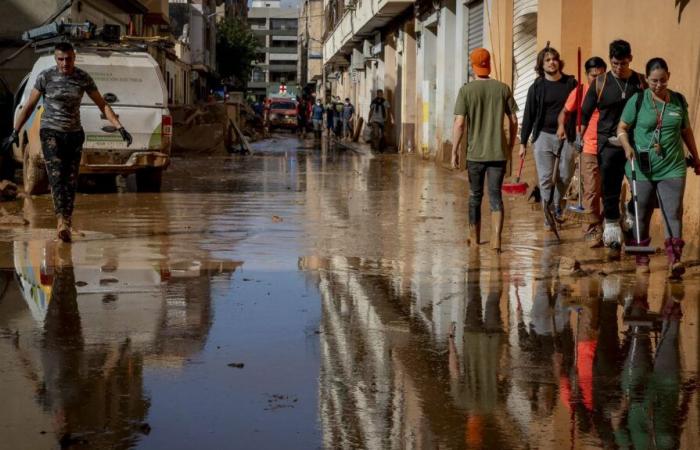A week has passed since the start of the bad weather which devastated the Valencia region, Spain. Prime Minister Pedro Sánchez announced at a press conference on Tuesday, November 5, a first emergency plan of 10.6 billion euros to help affected residents and businesses. LThe government will take charge “100%” urgent expenses incurred by municipalities to help their citizens and clear the streets, he added, also ensuring that the number of soldiers, members of the national police and civil guards deployed by the Spanish government had just been multiplied by two (from 7,300 to nearly 15,000). But a week is a long time. Especially with their feet in the mud, without means of transport and with limited access to running water.
Why weren't residents warned of the danger more quickly? And why, in the hours following the disaster, was help so slow to arrive? The regional government of the autonomous community of Valencia, led by Carlos Mazón, from the main opposition party, the Popular Party, and the executive of the socialist Pedro Sánchez, blame each other for the failures in crisis management. However, these shortcomings, a catastrophe within a catastrophe, are born from political tensions which cross the different administrative strata of the country.
Twelve hours passed between the red alert issued by the Spanish meteorological agency, Aemet, and the sending of an alert message to the cell phones of residents in the Valencia region. Criticized for this delay, the local executive blamed the Hydrographic Confederations, the regional agencies responsible, among other things, for monitoring rivers. Pointing the finger at this service which comes not from the Generalitat (the local government), but from the State, Carlos Mazón criticized it for having delayed in warning the local authorities of the possible devastating consequences of the expected torrential rains. But in a decentralized Spain, “It is the regional emergency services which have the competence to issue hydrological alerts”recalled the Ministry of Ecological Transition, defending the services concerned.
Earlier, Carlos Mazón had deplored the slowness of the intervention of the Military Emergency Unit (UME), before being taken up jointly by its director, General Francisco Javier Marcos, and by the Ministry of Defense. “It is up to the Region, in charge of the emergency system, to request troops”, said the latter, while the soldier assured “have scrupulously followed the protocol”while waiting for the green light from the regional president to send teams to the site. Hiccups likely to have cost the lives of residents. “We were the first responders on site”was surprised on Monday on franceinfo Gentil De Passos, head of mission at the French Disaster Relief Group (GSCF) for Spain.
The population was quick to make this astonishing observation the reason for deep anger towards the leaders, whatever their scope of action. On Sunday, King Felipe VI, Pedro Sánchez and Carlos Mazón were greeted in the devastated streets of Paiporta with cries of indignation (“Assassins!”) and mud jets. “Because of the lack of coordination between the central state and the autonomous region, aid did not arrive in certain places when people needed it, (…) which accentuated the unease” of the local population, reports in daily life The Country Paloma Román, political scientist at the Complutense University of Madrid.
The historian Agnès Delage, specialist in contemporary Spain at the University of Aix-Marseille, notes in turn that “the decision-making circuits are not the same, whether for the army, the firefighters, or the police, which is decentralized. And again, the situation depends from one autonomous region to another”, she summarizes. In addition to a governance problem, it thus points out “a decision-making problem, particularly knowing what to do [quand l’agence météorologique émet] a red alert.” The Aemet bulletin was published at 8 a.m. on October 29, she recalls. “At 11 a.m., the University of Valencia took the decision to suspend classes, which probably saved hundreds of lives (…) At 8 p.m., people received the alert on their phones while They were drowning.”
The disaster also highlighted a recent decision by the regional government: the elimination of a crisis management unit coordinated at the Valencian level, the UVE. “It had been voted for and financed by the previous regional government, from a left-wing coalition. When it came to power, the right-wing coalition – the PP allied with the far-right party Vox – abolished it before it could not be operational, on the grounds that it was “a golden closet for the political friends of the previous power”, explains Agnès Delage. If we cannot attribute the failures of crisis management to this aborted system, the researcher notes that this decision tragically illustrates the operation of unraveling the flagship measures of the previous executive carried out by the new Generalitat, in power since 2023. “Instead of an alternation, there was what the newspaper The Diary defined as 'an environmental counter-reform'”she continues, observing climate skepticism “institutional”.
By targeting the environmental measures taken by its predecessors, the People's Party “adopted the views and rhetoric of the far right on the environmental issue”, analyzes Agnès Delage, recalling that it was the alliance between the traditional right-wing party and the very young Vox party which allowed the shift of the regional government after “extremely tense elections.” So, “before highlighting a need to redefine technical governance perimeters, [la catastrophe] illustrates a brutalization of public life”, she continues, while the question of adaptation to climate change has suffered from having been presented by some as an exclusively partisan maneuver.
In a column published by the British daily The Guardianclimatologist Friederike Otto, co-founder of the network of scientists World Weather Attribution, responsible for questioning the link between extreme weather episodes and climate change, judges that the Spanish case must alert all European countries on the management of these crises, called to repeat. “Should the EU have funds for prevention, rather than spending money on cleaning up after the disaster? I think we definitely need to increase funds and develop coordinated plans”she warns. In the meantime, alongside the envelope of more than 10 billion euros promised Tuesday by Pedro Sánchez, Carlos Mazón announced that his regional government would spend 250 million to respond to the crisis. He had earlier estimated the needs of the affected population at more than 31 billion.






